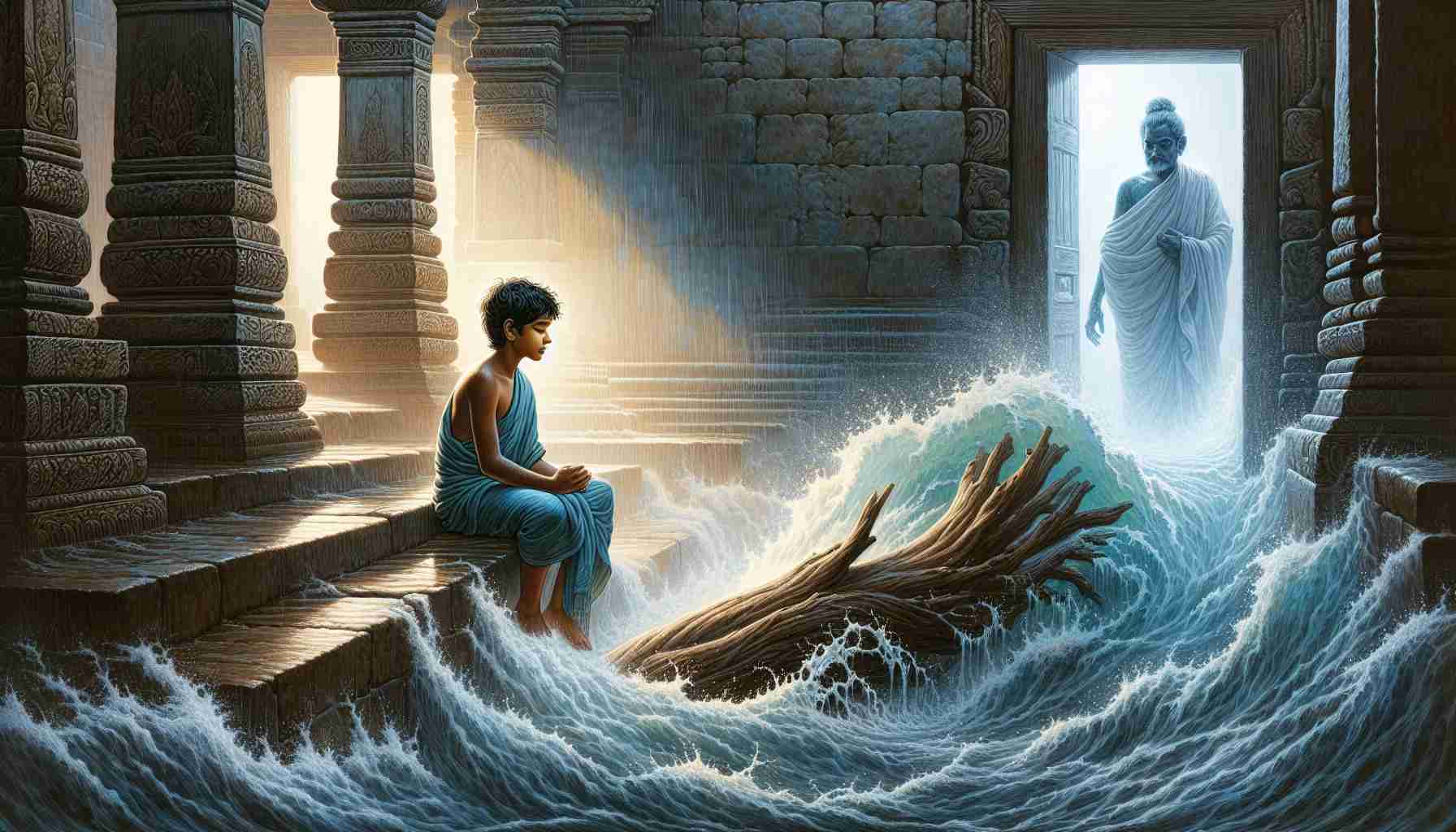

The rain had been falling for days. Every path in our village turned to mud, every roof dripped, and the river swelled until it touched the bottom steps of the temple. I was ten years old then, still trying to understand why Master Shen said, “Be like water,” every time I grew angry or restless.
“I don’t want to be water,” I once told him, sulking after I lost a race to the older boys. “Water is slow and soft. I want to be strong and fast!”
Master Shen only smiled, gently placing a hand on my shoulder. “Even the strongest mountain is carved by the softest stream, little Jun.”
I didn’t understand then. But that stormy week, everything changed.
One morning, as I sat under the overhang of the temple roof, watching the river churn with brown water, I noticed something strange. A log got caught on a rock. It stood straight up, stuck, wobbling with the heavy push of the river. I stared as the water kept rushing past it, splashing and roaring. Then, a long wave came, curling with quiet power. It didn’t crash against the log like the others. It bent, flowed under, slid around—and suddenly the log broke free. Just like that.
I sat up straight. Something about that wave tugged at my heart.
Master Shen walked silently behind me. He had the way of a cat—there and not, seen and unseen.
“You saw the yielding wave,” he said, like he had been watching too. “What did it teach you?”
“I don’t really know…” I answered honestly. “That it didn’t fight the log. It just... let go. And somehow, the log moved.”
He nodded, pulling his robe tighter against the wind. “When you push hard against the world, the world pushes back. But when you follow the flow, you can go far without force. That is Wu Wei—non-action, not in laziness, but in harmony.”
I looked at the river again. It didn’t stop. It didn’t shout. It just kept flowing—bending, moving, carrying even the heaviest things without a fight.
That night, I stayed up long after the rain stopped. I thought about the times I had pushed too hard, yelled when I could’ve listened, or rushed instead of waiting. The Tao, the Way, wasn't about winning or being first. It was about moving with life, not against it.
The next day, when the boys raced again, I didn’t try to be first. I watched their feet splash, listened to the wind in the trees, and let my feet follow without worry. I didn’t win—but I laughed harder than I ever had.
Years have passed since then. But when life feels too heavy, when I want to grab and pull and fix everything, I remember the yielding wave. I sit, breathe, and trust the flow.
I didn’t change all at once. But now, when I face something stuck in my path, I think like water. And slowly, I keep learning to live the Way.
The rain had been falling for days. Every path in our village turned to mud, every roof dripped, and the river swelled until it touched the bottom steps of the temple. I was ten years old then, still trying to understand why Master Shen said, “Be like water,” every time I grew angry or restless.
“I don’t want to be water,” I once told him, sulking after I lost a race to the older boys. “Water is slow and soft. I want to be strong and fast!”
Master Shen only smiled, gently placing a hand on my shoulder. “Even the strongest mountain is carved by the softest stream, little Jun.”
I didn’t understand then. But that stormy week, everything changed.
One morning, as I sat under the overhang of the temple roof, watching the river churn with brown water, I noticed something strange. A log got caught on a rock. It stood straight up, stuck, wobbling with the heavy push of the river. I stared as the water kept rushing past it, splashing and roaring. Then, a long wave came, curling with quiet power. It didn’t crash against the log like the others. It bent, flowed under, slid around—and suddenly the log broke free. Just like that.
I sat up straight. Something about that wave tugged at my heart.
Master Shen walked silently behind me. He had the way of a cat—there and not, seen and unseen.
“You saw the yielding wave,” he said, like he had been watching too. “What did it teach you?”
“I don’t really know…” I answered honestly. “That it didn’t fight the log. It just... let go. And somehow, the log moved.”
He nodded, pulling his robe tighter against the wind. “When you push hard against the world, the world pushes back. But when you follow the flow, you can go far without force. That is Wu Wei—non-action, not in laziness, but in harmony.”
I looked at the river again. It didn’t stop. It didn’t shout. It just kept flowing—bending, moving, carrying even the heaviest things without a fight.
That night, I stayed up long after the rain stopped. I thought about the times I had pushed too hard, yelled when I could’ve listened, or rushed instead of waiting. The Tao, the Way, wasn't about winning or being first. It was about moving with life, not against it.
The next day, when the boys raced again, I didn’t try to be first. I watched their feet splash, listened to the wind in the trees, and let my feet follow without worry. I didn’t win—but I laughed harder than I ever had.
Years have passed since then. But when life feels too heavy, when I want to grab and pull and fix everything, I remember the yielding wave. I sit, breathe, and trust the flow.
I didn’t change all at once. But now, when I face something stuck in my path, I think like water. And slowly, I keep learning to live the Way.